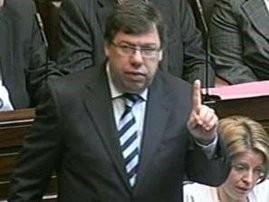Tribunal is only way to get answers on banks

Nearly eight years ago, on April 11th, 2002, seven judges of the Supreme Court thought it necessary to convey their views on Oireachtas inquiries into the Abbeylara case with a verbosity that even they themselves never exceeded, either before or since.
The combined judgments come to 123,900 words, more than most large books. The judgments are repetitive and at times rambling. For these reasons it is hardly surprising that few people have ever read them. Life is short.
But the seven judgments convey a clear message – or at least five of them do: that Oireachtas inquiries that impinge on the reputations of citizens are unconstitutional. And there is no way of getting around that.
If this banking inquiry is to be so anodyne as not to impinge on the reputations of bankers, regulators, civil servants and Ministers, there is hardly any point to it. Not that such an inquiry should target individuals, or that the purpose of the inquiry should be to name and shame. Rather that, inevitably, a thorough inquiry into what caused the banking crisis must surely infer the culpability of identifiable individuals. Such an inquiry, conducted by members of the Oireachtas, would be unconstitutional. No question.
Before reading the judgments last Monday, I had thought there was precedent in the famous Haughey case of 1970 that validated Oireachtas inquiries. That case arose out of an inquiry by the Committee of Public Accounts into monies voted in 1969 for the relief of distress in Northern Ireland. Some of that money went to purchase arms.
The Haughey in question was not Charlie Haughey but his brother Padraig, otherwise known as Jock. Jock was believed to have had an involvement in the attempted arms purchases. Jock refused to appear at the Oireachtas inquiry and his refusal was referred to the High Court and later the Supreme Court.
The judgment in that case was delivered by one of the great constitutional jurists of the State’s history, Cearbhall Ó Dálaigh, and the court at the time included two other jurists of great stature, Brian Walsh and Seamus Henchy. In the judgment, the rules for the conduct of such inquiries were laid out, inferring, I believed, that such inquiries were constitutionally okay. In the 2002 Abbeylara case, former chief justice Ronan Keane thought the same. Other judges in the Abbeylara case contended that as with the issue of constitutional validity raised in the Haughey case, the court had not then decided the issue.
Ronan Keane did hold that Oireachtas inquiries were valid. He held: “The findings of a body such as the committee can be wholly ignored or disregarded by persons referred to in their report without the slightest possibility of any legal sanction being imposed upon them as a result.” He said the right of persons to their good name “must be balanced against the right, and indeed the duty, of the Oireachtas to inquire into and inform themselves as to matters which are relevant to the discharge by them of their constitutional functions”.
His colleague on the court at the time, Frank Murphy, agreed. However, every one of the other five judges decided against and, crucially, three of these – current chief justice John Murray, Susan Denham and Adrian Hardiman – still serve the court.
Susan Denham disagreed with the contention that the power of the Oireachtas to hold inquiries was inherent in the Constitution, and disregarded the argument that such inherence was evident in the powers of the British parliament and the US Congress to hold such inquiries.
John Murray said: “Had it been intended that the Oireachtas, as part of the political process, should exercise such far-reaching powers of inquiry, the Constitution would have explicitly said so.” Catherine McGuinness said: “I would accept that the Dáil and Senate, and the Houses of the Oireachtas jointly, have an important power to inquire . . . The power however does not extend to the making of ‘findings of fact’ concerning the individual culpability of non-members of the Oireachtas which involve damage to the good name of such individuals.”
Adrian Hardiman said: “As a matter of history, the Parliamentary Committee of Inquiry into scandals, negligence, misfeasance, fatalities at the hands of police or troops and military disasters, had become thoroughly discredited by 1921. Moreover, on the evidence, the Westminster Parliament has not been persuaded to return to this method of inquiry into such matters, with or without procedural improvements. The tribunal of inquiry has, in that jurisdiction, continued to be the preferred instrument of inquiry.”
Hugh Geoghegan quoted approvingly an affidavit sworn in relation to the Abbeylara case by the former secretary of the Department of Finance, Sean Cromien, in which he said: “The very political effectiveness of politicians, which is based on their closeness to public opinion as expressed both directly and through the media, and the ability to respond quickly and effectively to it, is likely to be a drawback where politicians are expected to operate in a quasi-judicial manner, as in this inquiry by the subcommittee.”
Sean Cromien was less than impressed by the Dirt inquiry.
It has to be another tribunal. Sorry for the bad news.
